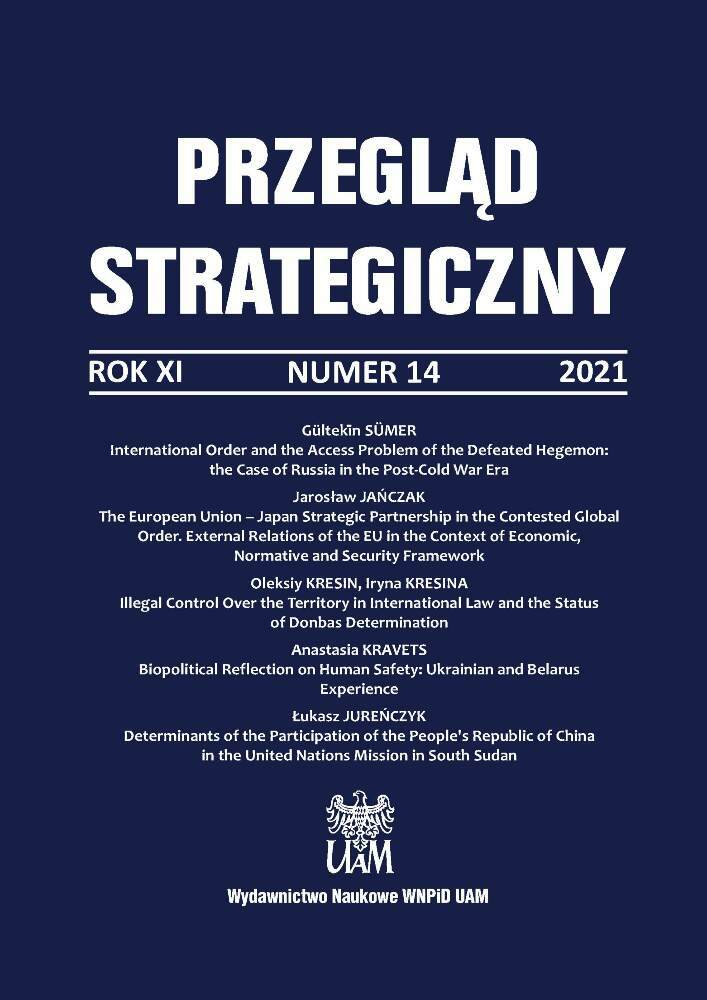Abstract
The purpose of the study is to investigate what communication and media technologies and information operations are used by the mass media of the Russian Federation in relation to Ukraine to propagate the image of the “other/alien”. The methodology chosen for the work combines the application of the following methods and approaches: network analysis, SWOT-analysis, system, integrated and civilization approaches, system analysis, method of systematization and classification, methods of analysis, synthesis, objectivity, generalizations, analogies, case study, etc. The article explores the use of communication, media and information-psychological technologies by the Russian mass media to create and effectively promote the image of an enemy, alien, the other during the Russian-Ukrainian conflict, which began in 2014. The authors insist that the “Russkiy Mir” idea is promoted through the propaganda and manipulation resulting in the image of the adversary of this idea – “the other.” The “Russkiy Mir” foe does not perceive everything with the designation “Russian” as a priori positive and better, doubt the correctness of such a position, and therefore wishes evil to the supporters of the “Russkiy Mir”. Information operations and the most widespread media technologies in the Russian-Ukrainian information warfare are analyzed to model the image of “the other” as a threat. Prospects for further scientific researches are connected with the study of new scientific concepts that is some network-centric warfare, hybrid warfare, cyberwarfare, asymmetric warfare, undeclared information warfare, and others.
References
Alexandrov P. (2019), Media Interpretations of Modern Threats.
Andriyevskyy T. (2017), Purposes of the Russian-Ukrainian Hybrid War, “De Securitate et Defensione O Bezpieczeństwie i Obronności”, No. 2 (3).
Badrak V. (2016), Information Front of the Kremlin, in: Communication and Content Security in the Conditions of Hybrid Messianic Aggressions of Putin’s Russia, (ed.) V. Balabina.
Brzezinski Z. (2000), The Grand Chessboard: American Primacy and Its Geostrategic Imperatives.
Brekhunenko V. (2017), War for Consciousness, Russian Myths about Ukraine and its Past.
Feskov І. (2016), The Main Methods of Conducting a Hybrid Warfare in the Modern Information Society, “Topical policy issues”, Vol. 58.
Horban Yu. (2015), Information Warfare against Ukraine and the Means of Its Waging, “NADU Herald”, No. 1.
Horbulin V. P. (2017), World Hybrid War: Ukrainian Front: Monograph.
Goyman O. (2015), Reincarnation of Soviet Myths in the Modern Information War., “Anthropological Studies. Series: Philosophy”, Issue 32.
Iumen Evfimiy (Moiseev), The Concept of the “Russian Mir” as a Civilization Project of the 21st Century, http://kurskpds.ru/articles/kontseptsiya-russkogo-mira-kak-tsivilizatsionnyy-pro-ekt-khkhi-veka/ (06.03.2021).
Karpchuk N. P. (2019), Use of Russian History in the Information War, “Glossary: An Encyclopedic Dictionary of Information Security Handbook”, (ed.) A. Shuliak.
Komarchuk О. (2019), Manipulative Technologies of Mass Communication in the Conditions of Hybrid Warfare.
Korol V. (2016), Kremlin’s Communication and Content Aggression: Characteristics, Trends, Organization of Resistance, “Communication and Content Security in the Conditions of Hybrid Messianic Aggressions of Putin’s Russia”, (ed.) V. Balabina.
Kozyriatska S. (2016), Discourse Practices of the Russian Media Sphere: Synthesis of Two Ideologies or Blurring of Landmarks, “Scientific Works of the Ivan Ohienko Kamianets-Podilskyi National University. Philological Sciences”.
Kuznietsova Т. (2007), The Friend-or-Foe in the Media Text Space, “Style and Text”, Vol. 8.
Lasswell H. (1929), Propaganda Technique in the World War.
Modern Kremlin Mythology: How Russia Uses History in Propaganda, https://www.stopfake.org/uk/suchasna-kremlivska-mifologiya-yak-rosiya-vykorystovuye-istoriyu-u-propagandi/ (06.03.2021).
Moskalchuk V. (2015), Content Analysis of Russian Media on the Concept of Network-centric Warfares, http://naub.oa.edu.ua/2015/%D0%BA%D0%BE%D0%BD%D1%82%D0%B5%D0%BD%D1%82-%D0%B0%D0%BD%D0%B0%D0%BB%D1%96%D0%B7%D1%80%D0%BE%D1%81%D1%96%D0%B9%D1%81%D1%8C%D0%BA%D0%B8%D1%85-%D0%B7%D0%BC%D1%96-%D1%89%D0%BE%D0%B4%D0%BE-%D0%BA%D0%BE/ (06.03.2021).
Nikolaienko N., Vasylevych Yu., Komarchuk O. (2019), Communicative Strategies of the Russian-Ukrainian Hybrid War Information Component, “Scientific Bulletin of Lesya Ukrainka Eastern European National University”, No. 8 (392).
On the approval of the Doctrine of Information Security of the Russian Federation: Decree of the President of the Russian Federation of 05.12.2016, http://kremlin.ru/acts/bank/41460 (06.03.2021).
On the Strategy of Information Society Development in the Russian Federation for 2017–2030: Decree of the President of the Russian Federation of 09.05.2017 No. 203, http://kremlin.ru/acts/bank/41919 (06.03.2021).
Serhiychuk Z. (2015), Structural and Semantic Opposition of “the Friend-or-Foe” in the Genre of Brief Information Note, “New Information Situation and Trends of Alternative Development of Media in Ukraine”.
Smola L. (2016), Aspects of Information and Hybrid Warfare Waging in the Context of Communication Technologies Application, “S.P.A.C.E”, No. 1.
Shutov R. (2014), Russian Propaganda in the Ukrainian Media Space, http://osvita.mediasapiens.ua/monitoring/advocacy (06.03.2021).
Saprykin O. A. (2016), Internet Resources as a Tool of Information Warfare and Security of Ukraine.
The language of hostility in the print media of Donbass on both sides of the front line: a study, “Donetsk Institute of Information”, http://dii.dn.ua/analytics/125-mova-vorozhnechi-v-drukovanykh-zmi-donbasu-poobydvi-storony-linii-frontu (06.03.2021).
Turchynov О. (2016), Formation of a New World Balance of Power and Prerequisites for the Russian Aggression against Ukraine, https://ua.112.ua/mnenie/formuvannia-novoho-svitovoho-balansu-syl-ta-peredumovy-rosiiskoi-ahresii-proty-ukrainy-332465.html (06.03.2021).
Tykhomyrova Ye. (2019), RТ (Russia Today), “Glossary: An Encyclopedic Dictionary of Information Security Handbook”, (ed.) A. Shuliak.
Wasiuta O. (2019), “Russkiy mir” as a Technology of Penetration/Influence of the State, “Glossary: An Encyclopedic Dictionary of Information Security Handbook”, (ed.) A. Shuliak.
Wasiuta O., Wasiuta S. (2017), Russia’s Hybrid War against Ukraine.

